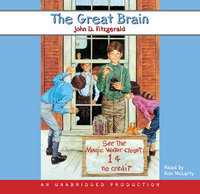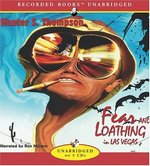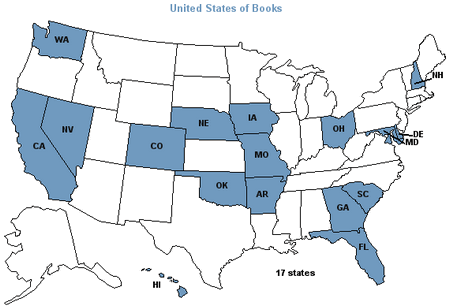 The Great Brain
The Great Brain
by John D. Fitzgerald, Ron McLarty (Narrator)
Series: The Great Brain, #1Unabridged Audiobook, 4 Hours, 41 Minutes
Listening Library, 2002
Read: February 25 – 26, 2019

Growing up, these stories about a pre-teen con artist in late 19th Century Utah were among my favorites. I remember stumbling on a box set at a Yard Sale after I’d read them from the Library a couple of times and just about wore out the set reading and re-reading them. Even then, I remember that I had problems with some of the characters, and recall that my favorite was always the narrator, John D., not the titular Great Brain himself, Tom D. About 10 years ago, I read the series to my kids, and enjoyed it (possibly more than they did), but not as much as I remembered. Still, when I saw it listed as a new addition to my library’s catalog, I took a second glance and when I saw that Ron McLarty did the narration, I had to try it.
This book is a series of episodes from over a year or so in the life of three brothers, Sweyn D., Tom D. and John D. Fitzgerald. Sweyn is around a little bit as the more mature eldest brother, John’s the youngest (8 or 9, I believe) and Tom is 10 and the star. He’s Greedy, conniving, and ambitious — and his ego is bigger than the rest of his attributes combined. They live in a small, largely LDS, town in Utah during the last decade of the 1800s. The episodes feature different ways in which Tom’s Great Brain works to make him money and/or notoriety in the community, especially with the kids.
Some of these antics are silly, some are serious. Almost all of them are profitable for Tom. The strength of the stories is the humanity of the rest of the community — the traveling Jewish merchant, the local farmers, the Greek immigrant family, for starters. The weakness comes from the very laissez-faire approach to parenting the Fitzgeralds take — allowing Tom D. to pretty much get away with everything he wants.
There is some charm, some heart, throughout — even from Tom. That part appeals to me, the ego-driven greedy exploits of the Great Brain don’t. John’s narration occasionally will critique Tom’s motives, but mostly John’s a little brother thinking his big brother is fantastic no matter what. I know John becomes more disillusioned later, but for now, it was annoying. I want better for him.
How’s the narration you ask? Honestly, the chance to listen to Ron McLarty narrate was half the reason I had for grabbing this. McLarty will always be Sgt. Frank Belson to me, despite the many other things he’s accomplished in life. He did a fine job, at times a great job. Something about him reading the contraction-less dialogue bugged the tar out of me. George Guidal can make it work when he reads Henry Standing Bear — although it helps that no one else does it. McLarty can’t make it work, probably because despite the fact that slang is used, time appropriate language — but not a contraction from anyone? I don’t lay the fault at McLarty’s feet, it’s just a prominent feature.
I still recommend the books and enjoyed them. It’s just a tempered enjoyment. I’ll probably keep chipping away at the series over the next few months — waiting to see John’s disillusionment grow, and the brothers develop a conscience.
—–







